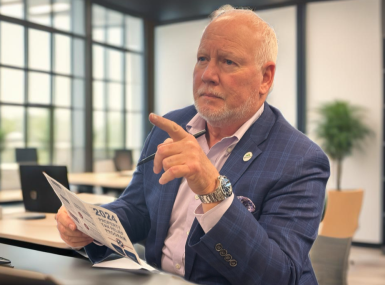Boot camps train newly elected county officials

Key Takeaways
Springfield County, Md.’s councilmembers seemed to be stepping on rakes every way they walked.
They ignored conflicts of interest, flouted open meetings laws and just couldn’t do anything right. Michael Sanderson, the executive director of the Maryland Association of Counties, was fine with that. The fictional county was a cautionary tale for the 60 newly elected county officials starting in 2023: Don’t do what Commissioner Donnie Don’t does. That buffoonish behavior at the association’s Winter Conference in January illustrated exactly what not to do, and that would be a more memorable lesson than simply modeling good behavior.
“A lot of people are coming into office with no experience, they’ve just been campaigning, and we want to let them know that this isn’t going to be like running a Rotary meeting — there are ethics laws, procedures and things like that,” Sanderson said. “There’s an adjustment, and we want to make it smooth. We have a pretty big wave of new folks starting at the same time this year, so we had an obvious window to help them get started.”
Peruse the curricula
Idaho's County Officials Institute
While NACo is still compiling local statistics on the 2022 election, anecdotal evidence suggests roughly a change in one-third of the seats every four years, with that figure potentially rising as state term limits take effect. That means a significant portion of the experience and institutional knowledge leaves county courthouses and makes education for public officials a priority.
The Maryland association still sends everyone home with a three-ring binder packed with reference materials, but Sanderson said some of the most valuable learning came when he mixed the rookies with veterans and got them talking shop.
“They sit around the table and talk about how you conduct yourself at the grocery store when that neighbor suddenly is pestering you,” Sanderson said. “They really are hungry for that kind of advice and guidance and not getting it from a random person, not from their county, but just somebody who’s done this kind of stuff before.”
Ralph Patterson knew his way around the Charles County, Md. courthouse, usually when he’d come to visit his mother, now state Del. Edith Patterson, who was a commissioner for eight years. He took office in January, and pivoting from 17 months of campaigning to governing was daunting, and so too was his apprehension before the training.
“I was always afraid that was going to be like a graduate-level class, where you’d be sitting there trying to drink from a firehose,” he said. “They made everything digestible. They know we’re getting hit with a lot at once, so they were careful not to pile on too much.”
Chief among his concerns was learning about state legislative issues and how he could best communicate their local effects to his constituents
“They didn’t tell us how to vote, but they basically showed us the pros and cons of those issues,” Patterson said.
Brandy Grace brought her experience as Milliard County auditor to her job as CEO of the Utah Association of Counties, and that has guided her revision of the association’s educational programs. She has 56 new elected officials in the 2023 cohort.
“I thought about everything I wished I had known back then,” she said about developing the curriculum. “The most important thing was strategically timing the lessons to they’re coming when they’re really needed, rather than trying to learn everything at once.”
Utah county officials start off with a lesson on the legal requirements to run meetings and manage governmental records, with a primer on the state legislative process. In March, they reconvene to learn about property values and the overall ecosystem of the local public sector.
“I try to help them understand the various elected roles so they kind of know who’s responsible for what in their county, how we all incorporate,” Grace said. “We talk about property documents being recorded, then the assessor values them, then the auditor determines the tax rate and the treasurer sends out the tax bill. A lot of them haven’t worked in the public sector before, so we try to put it all together for them.”
The association partners with Utah State University to use extension offices throughout the state for seminars, which run for a few hours. September includes a budgeting workshop and the students celebrate their first year in office in December. From there, county officials can take enrichment classes through Utah State on specific topics.
Classes were online for Idaho officials in 2020, when the Idaho Association of Counties debuted its formalized County Officials Institute, and after a soft in-person launch in 2021, the association took the show on the road in fall 2022, holding classes in Latah and Bonneville counties. The institute’s course catalog covers 18 credit hours of core courses and 12 hours of electives.
“We’ll touch on planning and zoning, ethics and the basics, but we come back and give them a chance to work more hands-on with topics once they’ve had some time in office,” said Kristin Cundiff, director of operations for IAC, who has guided the program during her tenure. “We can talk about different scenarios and hypotheticals.”
While it’s geared toward the first-year commissioners, Cundiff said she sees plenty of experienced officials coming back for more.
“We’ve had some people take classes five times in the last 10 years because they learn something new every time,” she said.
That kind of mixture of the blank slates and the experienced officials is better than she had ever planned, and Sanderson aims for the same mix in Maryland conferences.
“We try to put the new people in tables with state senators with county government experience and give them a chance to really hear it from all perspectives,” he said. “There’s super-high value for the brand-new elected official who used to sell used cars, and now they run a jail. Suddenly they’re the ones being handed the keys for the first time and that takes some getting used to. We just try to surround them with good teachers and good information.”
Attachments
Related News

Now I know getting the public’s attention is hard
Kalamazoo County, Mich. Commissioner John Taylor found that demonstrable results help draw the public's awareness of the work counties do.

Now I know to remember why I’m there
When David Copeland won a seat on the Tipton County, Tenn. Commission, he made it a point to increase outreach to his district in hopes of engaging his constituents.

Jackson County chair combines diverse experiences for effective leadership
A fellowship funded by the Congressional Black Caucus kick-started DaRon McGee’s career in public service, but his promise to his mother brought him back to Jackson County, Mo., where he's made his name.
